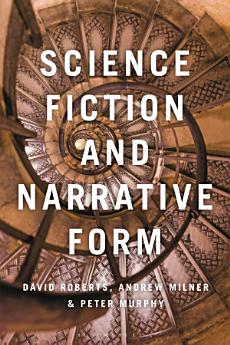Science Fiction and Narrative Form
Feb 2023 · Bloomsbury Publishing
Ebook
240
Pages
reportRatings and reviews aren’t verified Learn More
About this ebook
Establishing science fiction as its own distinct and increasingly important narrative form, this book explores how the genre challenges pervasive perceptions of society as they appear in the conventional modern novel. Inspired by, and building upon, Georg Lukács's criticism of the orthodox novel for its depiction of life as alienating and disjointed, Milner, Murphy and Roberts demonstrate that science fiction steps beyond this contemporary form to be a more constructive form of literature, one able to conceive of society as complete, integrated and well-rounded. Taking stock of three kinds of science fiction which lie outside the scope of the modern novel – theological/ ontological science fiction, the science fiction of future history and epic science fiction – this book demonstrates the genre's unique capacity to encapsulate the whole world, persons and events, things and objects in a glance, and address the motive behind the longing for meaningful totality.
With reference to a vast array of works by authors such as Michel Houellebecq, Elias Canetti, Isaac Asimov, Jules Verne, H. G. Wells, Aldous Huxley, Marge Piercy, Iain M. Banks, Margaret Atwood, Ursula K. Le Guin, William Gibson, Dirk C. Fleck, Philip K. Dick, George Orwell and Kazuo Ishiguro, this book offers a compelling argument for rethinking the position and potential of the science fiction novel and to challenge the way we perceive our culture.
With reference to a vast array of works by authors such as Michel Houellebecq, Elias Canetti, Isaac Asimov, Jules Verne, H. G. Wells, Aldous Huxley, Marge Piercy, Iain M. Banks, Margaret Atwood, Ursula K. Le Guin, William Gibson, Dirk C. Fleck, Philip K. Dick, George Orwell and Kazuo Ishiguro, this book offers a compelling argument for rethinking the position and potential of the science fiction novel and to challenge the way we perceive our culture.
About the author
Andrew Milner is Emeritus Professor at Monash University, Australia. His publications include Locating Science Fiction (2012), Again, Dangerous Visions: Essays in Cultural Materialism (2018), (with J. R. Burgmann) Science Fiction and Climate Change: A Sociological Approach (2020).
Peter Murphy is Adjunct Professor at La Trobe University and James Cook University, Australia. His publications include The Political Economy of Prosperity: Successful Societies and Productive Cultures (2020), The Collective Imagination: The Creative Spirit of Free Societies (2012) and Dialectic of Romanticism: A Critique of Modernism (2004).
David Roberts is Emeritus Professor, School of Languages and Cultures, Monash University, Australia. His publications include History of the Present: The Contemporary and its Culture (2021), The Total Work of Art in European Modernism (2011) and Dialectic of Romanticism: A Critique of Modernism (2004).
Peter Murphy is Adjunct Professor at La Trobe University and James Cook University, Australia. His publications include The Political Economy of Prosperity: Successful Societies and Productive Cultures (2020), The Collective Imagination: The Creative Spirit of Free Societies (2012) and Dialectic of Romanticism: A Critique of Modernism (2004).
David Roberts is Emeritus Professor, School of Languages and Cultures, Monash University, Australia. His publications include History of the Present: The Contemporary and its Culture (2021), The Total Work of Art in European Modernism (2011) and Dialectic of Romanticism: A Critique of Modernism (2004).
Rate this ebook
Tell us what you think.
Reading information
Smartphones and tablets
Install the Google Play Books app for Android and iPad/iPhone. It syncs automatically with your account and allows you to read online or offline wherever you are.
Laptops and computers
You can listen to audiobooks purchased on Google Play using your computer's web browser.
eReaders and other devices
To read on e-ink devices like Kobo eReaders, you'll need to download a file and transfer it to your device. Follow the detailed Help Center instructions to transfer the files to supported eReaders.






